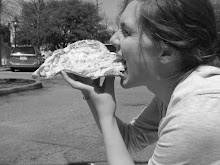I was just reading through some comments and I think Aaron does bring up a good point about what is more appealing in a story, "cute vs. tragic."
Like the old-timer I am, It reminds me of a story. One day I picked up my local newspaper to see a picture of kids playing in sprinklers on the front page.
"Really?" I asked, reading the equally flowery caption. "All that's going on and they put a picture some kids playing around in sprinklers above the fold?" I was being critical, edgy, like an angry Bruce Wayne peering down at the sinful Hillsdale County with all the rogue farmers and shifty Amish clomping around with their devil horses looking for trouble.
"Why not?" my dad asked, jolting me out of my self-involved fantasy. "What's wrong with focusing on something good and happy for a change? We're always seeing news about wars and death tolls."
I felt stupid, thought about getting defensive, but in the end let my silence speak for me. "Yeah, you're absolutely right," it echoed. The kids' bright swimsuits and expressive faces were making people smile and remember the simplicity of summer afternoons, why the hell was I complaining?
Not to get defensive now, but I guess because in my desire to write fiction, I learned that there has to be some conflict, some sort of deeper meaning that makes something worthy of reading. Or I thought I learned that. I wrote a story as a spacey teenager about the future me getting a job as a disc jockey in Florida and meeting amazing people and having this angsty sexual tension with my male housemate who I thought I hated for the first few months (there was a communication meltdown somewhere that led to us rooming together). But I never ended the story. I had tons of them. These happy what-if stories going on forever and ever. I guess when I write and read stories I like gritty real-life situations. They don't make me happy, but I like reading what I perceive as something closer to reality that sets it apart from the rainbow stories of my youth. Who knows.
I did love the Memory story, though, and I think that was mostly positive. It was turning this rest home life into something beautiful. They've lost so many people whom they loved, but have found avenues and new relationships that keep them going and give meaning to their lives. The story never overtly asks the question "Why am I still here?" but it was present throughout the piece. They live in a world mixed with past and present, the memories of their lost loved ones are as much present as characters as those still in the home. Rest homes are so fascinating. Also, on page 376, I laughed out loud several times at the line "The tiny Fleur, the woman who was always wanting to call her mother on the phone, asked the room in general, 'We havin' a party or somethin'?'" That's both cute and tragic, we've come full circle. I think Keely Houghton would think that was funny, too.
Telling True Stories
I'm really starting to appreciate the zoom in metaphor, because the more I think about it, the more the narrative story about the underground music scene I wrote last fall seems a little like a summary. I'm not sure, I'd have to read it over again.
I brought up the summary vs. dramatic narrative in one of my other English classes when talking about Mrs. Dalloway. I think that utilizes some dramatic narrative. I can dig it.
Subscribe to:
Post Comments (Atom)

you weren't, by chance, living in Barstow, Calif., when you saw that picture of kids playing in the sprinkler.
ReplyDeletehttp://www.desertdispatch.com/sections/article/gallery/?pic=1&id=3861
Some of my best work from the desert.